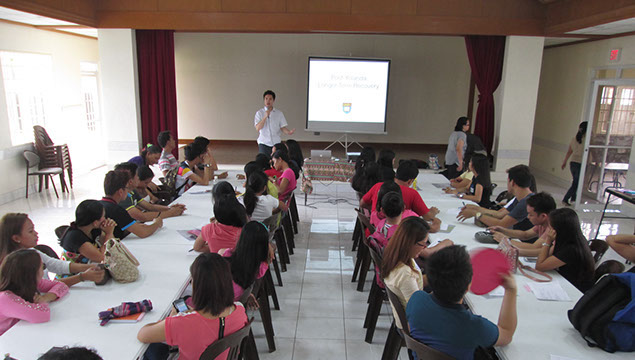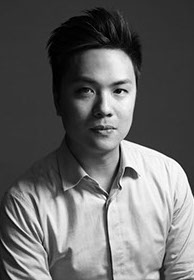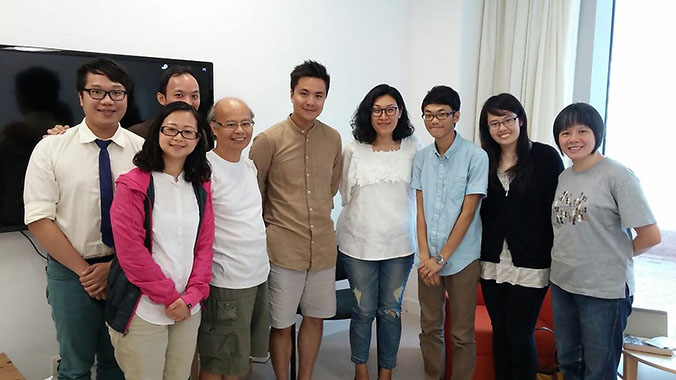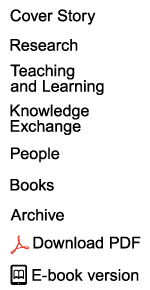
At one of the capacity building workshops for students in nursing and medical school.
Disaster-Prone Academic Helps Others To Heal
By both fate and design, Dr Christian Chan has found himself in the wake of natural disasters, observing and helping communities cope with the psychological after-effects.
From Kobe to Hurricane Katrina to Sichuan to Tacloban, Dr Christian Chan has encountered the effects of natural disasters on communities.
First, in 2005, he was living in Kobe, Japan during the 10th anniversary commemorations of the Great Hanshin earthquake and saw the lingering impact it had on the city. Then during graduate school, he worked with his advisor on pre- and post-Hurricane Katrina data from Louisiana that tracked psychological well-being, among other things. And before his studies were over, in 2008, the Sichuan earthquake struck and he gave up a promising internship to spend the summer there working with survivors.
“Kobe planted a seed, Katrina gave me a lot of important training, and Sichuan taught me a lot because you are facing immense suffering head-on and you have to do something about it,” he said. “I was just a student and I had very little to offer at the time, at least that’s how I remember it. But it was a very important experience for me and it also planted a seed.”
However, when he subsequently took up an assistant professorship in the Department of Psychology in 2012, he thought those seeds would never sprout, given Hong Kong is relatively disaster-free. He put disasters behind him and proceeded to work on other projects, such as the psychology of apologies. But in November 2013 the Philippines was struck by Typhoon Haiyan, the 25th typhoon that year, which was immediately followed by a tsunami-like storm surge that devastated the community of Tacloban.

Two of the vessels that were pushed ashore by the storm surge in Tacloban.
Long-term relationship
Dr Chan knew he had both knowledge and experience to offer the survivors and within a month he was in the Philippines. He connected with a non-governmental organisation (NGO) based in Manila and was brought to Tacloban where, to his surprise, he discovered he was the only psychologist on site.
“I came somewhat prepared, but I didn’t expect to be the only one,” he said. “So I started partnering with church pastors and other relief providers focussing on not just physical needs and necessities, but also trying to take care of people psychologically and spiritually.”
He made the most of scarce resources and began to train the trainers – something he quickly decided needed to be a long-term project.
“Usually by the fifth or sixth month after a natural disaster, all the big NGOs are gone,” he said. “But with disaster mental health, if you just go in for the short term, we know from the literature that it can be detrimental. People have established a trusting relationship with you and then you disappear – it can do more harm than good. If you really want to make an impact, then commitment is necessary. So I’ve been focussing on long-term relief and rehabilitation.”
He has made 10 trips to the Philippines, partly with Knowledge Exchange funding, to train ‘wounded healers’ like doctors, pastors, nurses, teachers and social workers who have direct contact with the community. He partners with pastors who provide a spiritual focus to the training while he focusses on psychological needs.

![]() If you just go in for the short term, we know from the literature that it can be detrimental. People have established a trusting relationship with you and then you disappear – it can do more harm than good. If you really want to make an impact, then commitment is necessary.
If you just go in for the short term, we know from the literature that it can be detrimental. People have established a trusting relationship with you and then you disappear – it can do more harm than good. If you really want to make an impact, then commitment is necessary. ![]()
Dr Christian Chan

Dr Christian Chan (first from right), with his local collaborators, Drs Meredith Labarda and Melba Maggay, and one of the workshop participants.
Meeting needs
“We’ve developed a model that is quite promising,” he said. “First we do focus groups and assessments, then we put together modular workshops that are framed around things people can relate to. For instance, when you mention depression and post-traumatic stress disorder, most people don’t know what you’re talking about, but everyone cares about sleep. So we say, let’s first talk about your sleep. We also have workshops on stress and coping, grief, and reconciliation between groups.”
The model was developed through surveys that were conducted each time service was provided, to ensure it was meeting people’s needs.
While the model is not ‘one-size-fits-all’, Dr Chan was able to draw on the experience to provide before-and-after training to volunteers who went from Hong Kong to Nepal after last year’s earthquake.
“The long-term work may not be very sexy but it is extremely important and there’s definitely a void in both the scientific literature and the psyche of society at large,” he said. On that note, he hopes to address the gap by developing his work on disaster mental health in the Philippines into research projects. A former doctor from Tacloban has enrolled as his PhD student, which will help to get the ball rolling.
“I do think Hong Kong people owe the Philippines a lot. We have two generations of Hongkongers brought up by Filipino domestic helpers,” Dr Chan added.

Dr Christian Chan (centre) provided before-and-after training to volunteers who went from Hong Kong to Nepal.
Back


